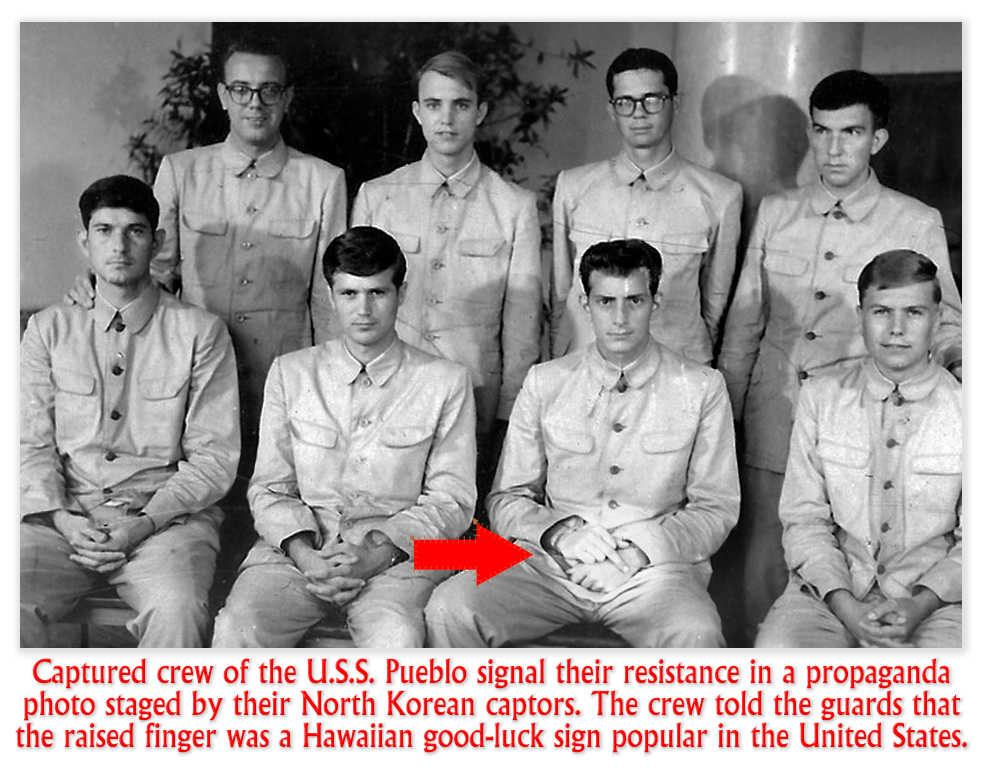We post news and comment on federal criminal justice issues, focused primarily on trial and post-conviction matters, legislative initiatives, and sentencing issues.
THE 6TH CIRCUIT’S REFRESHINGLY DEFERENTIAL APPROACH TO INEFFECTIVE ASSISTANCE
In an opinion piece in the Wall Street Journal yesterday, Richard Miniter urged President Trump to demand the return of the USS Pueblo, still held by North Korea after its 1968 illegal seizure in international waters. Miniter recalled Navy Commander Lloyd Bucher’s leading the crew to resist the North Koreans, who starved and tortured them. Once, the article recounted, Cmdr. Bucher instructed the crew to raise their middle fingers, a gesture he told his captors was a “Hawaiian good-luck sign.”
The change-of-plea pas de deux for defendant and judge in a federal criminal proceeding is dictated by Federal Rule of Criminal Procedure 11, and bears more than a passing resemblance to the staged photos and confessions so favored by despots such as Rocket Man, his daddy and grand-daddy. The defendant is asked whether everything has been fully explained to him, whether he’s happy with his lawyer, whether anyone has promised him anything not in the plea agreement, whether he feels forced into pleading guilty…
The truth, of course, is that the defendant is rarely happy with his lawyer right about then, usually has a slew of questions (many of which he does not yet know enough to ask), was told by counsel that all sorts of bad things would happen if he rejected the plea but that he would be treated gently if he took the deal… You get the idea. Deciding whether to accept a plea offer is a complex weighing of many factors: ironically, one of the least important, at least in the federal world, is whether the defendant is guilty of the offense.
Lawyers always tell their clients to not speak out of turn, let counsel do the talking, and – when asked any of the questions we described above – to answer affirmatively. Clients, fearful of the consequences of screwing up the plea deal after they had made the psychic investment needed to accede to it, follow counsel’s advice.
Of course, down the road the defendant may realize that counsel’s advice was not the gold-leaved diamond he believed it to be when he pled guilty or appeared for sentencing. Then, his defense attorney becomes a convincing witness for the government, and the defendant is, as Big Brother put in the iconic Apple Mac “1984” ad, buried with his own confusion.
 Indeed, sometimes it seems the only time a district court believes a defense attorney is when he or she provides an affidavit opposing a defendant’s 28 USC 2255 motion. Last week, however, the 6th Circuit threw the hammer on defendants’ behalf, reminding district courts that something more than mindless rejection of 2255 ineffective-assistance-of-counsel motions is required by the law.
Indeed, sometimes it seems the only time a district court believes a defense attorney is when he or she provides an affidavit opposing a defendant’s 28 USC 2255 motion. Last week, however, the 6th Circuit threw the hammer on defendants’ behalf, reminding district courts that something more than mindless rejection of 2255 ineffective-assistance-of-counsel motions is required by the law.
Andy Martin pled guilty to a scheme to rip off a mentally disabled patient, and then of conspiring to kill the patient’s trustee in order to pull off the fraud. Before sentencing, an attorney representing him in a civil suit over the same situation convinced him to file a pleading in the civil case in which Andy denied any intent to defraud the patient.
At sentencing, the government produced the pleading from the civil case, and argued Andy should not get any credit for acceptance of responsibility. Andy’s lawyer argued that the) motion was out of character for Andy, that he filed it in a misguided attempt to mitigate the damage done to his family, and that he nevertheless demonstrated an acceptance of responsibility by pleading guilty and in his allocution at the sentencing hearing. The district court denied any points off for acceptance.
Andy filed a pro se 2255 motion arguing that his trial attorneys provided ineffective assistance of counsel by telling him to file the civil motion, causing him to lose the 3-point reduction for acceptance of responsibility. Andy said one of his lawyers insisted that Andy include language in the civil motion that was contradictory to his guilty plea statement, and, when Andy asked whether it would affect his criminal case, his attorneys “assured him it wouldn’t.” Andy included an affidavit from his wife and mother saying the same thing.
The Government filed an opposition, attaching affidavits from Andy’s trial lawyers, the fee agreement between Andy and his lawyer relating to the civil case, and a billing statement from his lawyer for the civil representation.
Andy’s court denied the motion, saying that “although he asserts that there are facts in dispute, Martin offers no proof beyond mere self-serving allegations that either counsel was ineffective.”
 The 6th Circuit reversed, pointing out that Andy has presented far more than mere assertions of innocence. Andy’s 2255 motion contained specific factual allegations about the deficiencies of his attorneys’ advice and assistance relating to the civil motion. He alleged his lawyer agreed to advise him on the civil matter and that Andy paid him a $4000 retainer. He alleged that between his lawyer advised him to file the civil motion, reviewed his draft motion, insisted that he include language that contradicted his guilty plea, and assured him that it would not affect his criminal case or sentencing.
The 6th Circuit reversed, pointing out that Andy has presented far more than mere assertions of innocence. Andy’s 2255 motion contained specific factual allegations about the deficiencies of his attorneys’ advice and assistance relating to the civil motion. He alleged his lawyer agreed to advise him on the civil matter and that Andy paid him a $4000 retainer. He alleged that between his lawyer advised him to file the civil motion, reviewed his draft motion, insisted that he include language that contradicted his guilty plea, and assured him that it would not affect his criminal case or sentencing.
Because Andy presented factual allegations that supported his ineffectiveness claim, the Court said, he is entitled to an evidentiary hearing unless the allegations cannot be accepted as true because “they are contradicted by the record” or are “inherently incredible.” The court’s statement that Andy offered no proof beyond “mere self-serving allegations” failed to acknowledge that Andy supported his allegations with more than just his own words, but the words of others, too. Plus, a “self-serving” affidavit is not inherently incredible. Most affidavits are self-serving. In fact, in the 6th Circuit, a defendant’s statements alone are sufficient to support a finding that he would have accepted a plea offer.
A self-serving affidavit is not the same as a conclusory one. And the fact that Andy did not object at sentencing when the court snatched away the 3-level reduction does not mean much, either, the Court said. “It is unusual—and generally discouraged—for a represented defendant to make objections on his own, to make his own arguments outside allocution, or to otherwise interrupt the judge or lawyers at his sentencing hearing. Martin’s failure to independently object may simply reflect a client’s reasonable decision to rely on his attorneys and follow typical court procedure.” In other words, the defendant is not expected to employ the Hawaiian “good-luck” sign at change-of-plea or sentencing in order to protect his rights later.
 The 6th’s decision is a refreshing explanation of all the reasons district courts often place unjustified reliance on what a defendant does or does not say at sentencing, and how the fact that a defendant’s 2255 motion does not prove a fact does not necessarily make the fact inherently incredible, and thus undeserving of a hearing.
The 6th’s decision is a refreshing explanation of all the reasons district courts often place unjustified reliance on what a defendant does or does not say at sentencing, and how the fact that a defendant’s 2255 motion does not prove a fact does not necessarily make the fact inherently incredible, and thus undeserving of a hearing.
United States v. Martin, Case No. 16-3864 (6th Cir. May 14, 2018)
– Thomas L. Root


